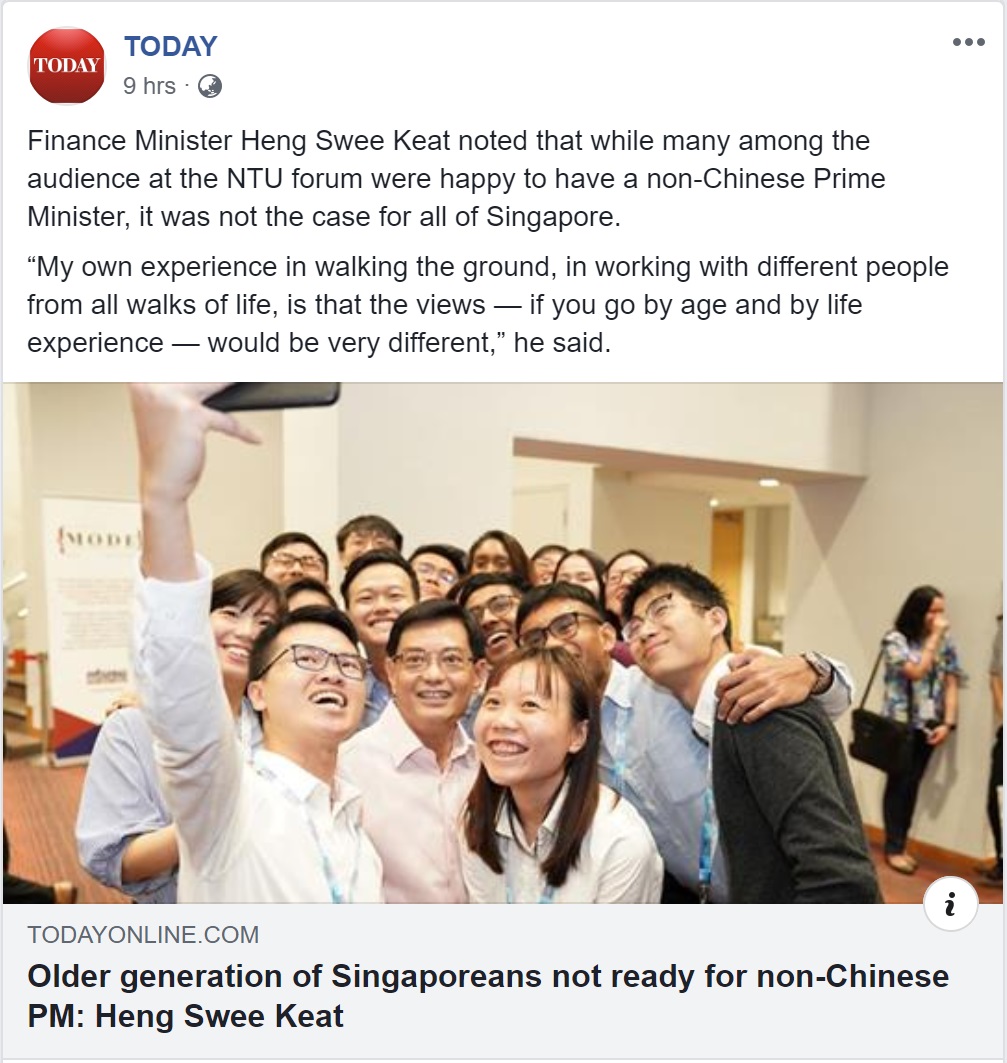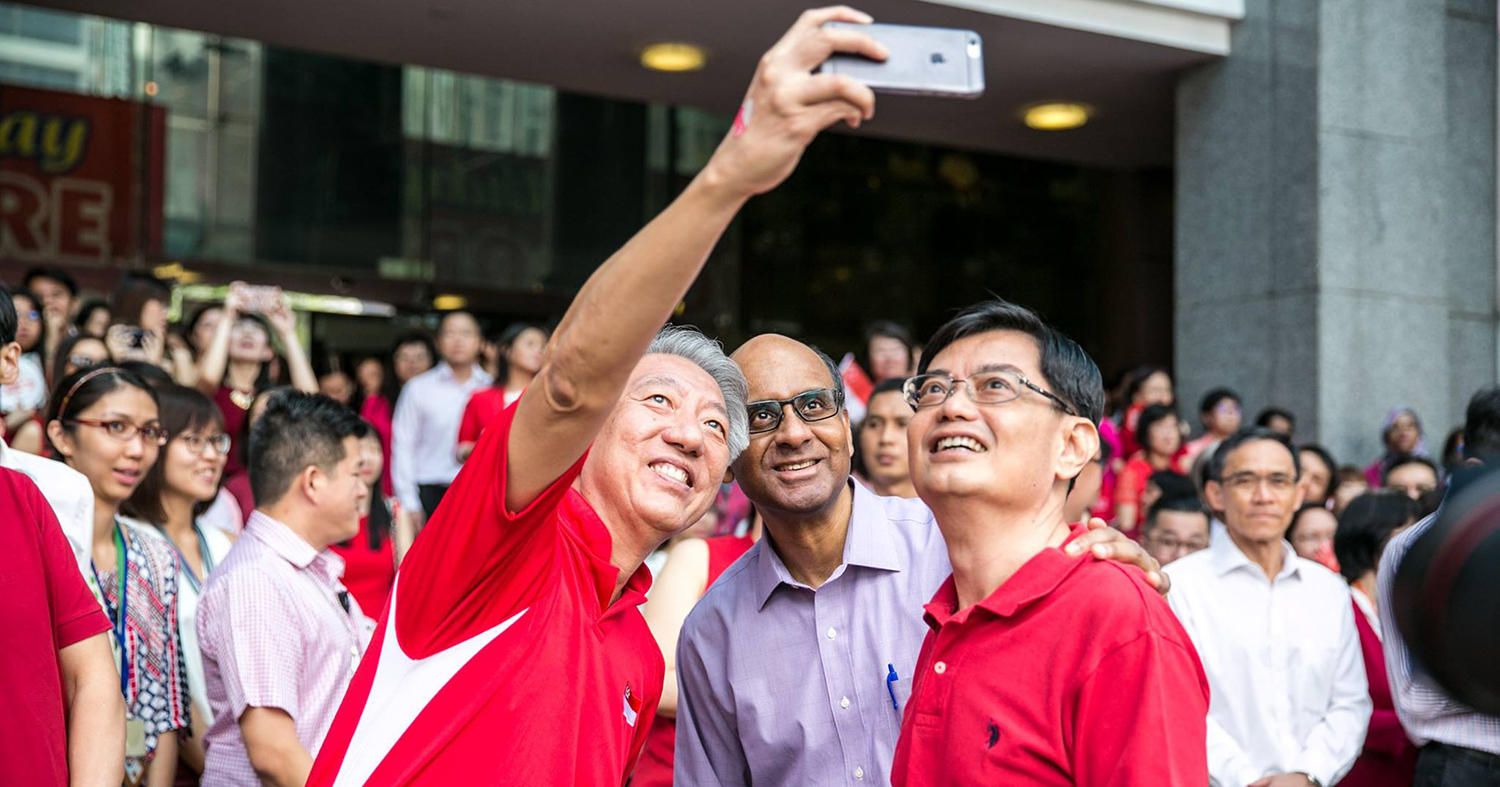Finance Minister Heng Swee Keat, front-runner to be the fourth Prime Minister of Singapore, mentioned about the possibility of Singapore having a ethnic minority PM.
But this has caused much online brouhaha because of the following headline by Today:
 Source: Today Facebook.
Source: Today Facebook.
The story which garnered nearly 300 shares and 400 comments, implied that Heng believed that the older generation of Singaporeans are not ready for a non-Chinese PM, even though younger Singaporeans from Nanyang Technological University are happy to have a non-Chinese PM.
Heng was replying to a question posed by a member of the audience at the NTU dialogue on March 28.
The Straits Times reported that Assistant Professor Walid Jumblatt of NTU's Public Policy and Global Affairs programme asked Heng whether it was Singapore or the ruling People's Action Party (PAP) that was unprepared for a PM from a minority community.
Today, on the other hand, reported that a member of audience noted that Deputy Prime Minister (DPM) Tharman Shanmugaratnam was a popular choice to take on the top job.
Today also mentioned Walid highlighting that Tharman’s popularity was evident in his constituency’s elections results.
DPM Tharman's team in Jurong GRC received 79.28 percent of votes during the 2015 General Election.
Enter several political pundits
Following the eyebrow-raising comments by Heng, several political commentators weighed in on the matter.
Ex-nominated member of parliament Calvin Cheng said that he suspected that older Singaporean Chinese may be a minority demographic themselves, and asked, in that case, "what is the logic behind saying that we can’t have a minority PM?"
Former editor of The Online Citizen Andrew Loh said that Heng's claim was based on Heng's own observations and not backed up by facts.Loh then asked, "are we pandering to racist views of the older generation, and/or the racists among them?"
Loh added:
"It would be shocking if we, in this day and age, chose our leaders based on the potentially racist views of a group of people, whether young or old - especially if this group is itself a minority group."
Author of Floating on a Malayan Breeze, Sudhir Thomas Vadaketh, called Heng's comments regrettable.
Vadaketh, who is one of the co-authors of Hard Choices: Challenging the Singapore Consensus, prefaced his post and said that he quite liked "Singapore's presumptive next prime minister" and he felt a need to point out room for improvement.
He also said that the PAP would "worship empirical evidence when it supports" it but "when the evidence is against it, the PAP convinces you to look instead at anecdotes, observations and feelings".
Vadaketh noted that "all the available electoral and survey evidence points to the fact that Singaporeans are very comfortable with non-Chinese leaders".
Bernard Chen, the Workers' Party's candidate for MacPherson SMC in the 2015 General Elections, noted "when Singaporeans were not ready, we made and accepted tough, unpopular decisions".Chen listed a number of moments in history including when Singapore separated from Malaysia, had to start military conscription, and move out from kampongs into HDB flats as examples of when Singaporeans were not ready for change but went with it anyway.
He added that "if our pioneering generation had waited for Singapore and Singaporeans to be ready, we would not have made the progress we’ve made in a generation, and to enjoy the success and stability we enjoy today".
What exactly did Heng say?
Many of the political observers appeared to have been influenced by Today's article.
Hence, it was important to compare the article with other media platforms.
Unfortunately, it appears that only ST and Today reported on the dialogue.
This was what ST reported:
"I will say that it is a very positive sign that the young people will be quite comfortable, precisely because our policy of regardless of race, language, religion has been an emphasis in our system for so long.
So that is why our young people grow up in a very different way and therefore you are quite ready. I do think that at the right time, when enough people think that way, we would have, we may have, a minority who becomes the leader of the country.
But if you ask me, that whether across the voting population, would that be the outcome, I personally don't think so."
And this was how Today reported:
"My own experience in walking the ground, in working with different people from all walks of life, is that the views — if you go by age and by life experience — would be very different, the finance minister said.
Nevertheless, Mr Heng said: I do think that at the right time, when enough people think that we may have a minority leader, a minority who becomes the leader of the country, that is something that we can all hope for."
He also noted that it was a good sign that young people today seem 'quite comfortable' with having a non-Chinese prime minister as it showed that the Government’s emphasis on standing united as one people "regardless of race, language or religion" had borne fruit.
Asst Prof Walid also asked if the Government was sending out contradictory messages by reserving the 2017 Presidential Election for candidates from the Malay community while stating that Singapore is not ready for a prime minister from a minority race.
Mr Heng stressed that it was "not contradictory". "It is precisely because we need to place this emphasis institutionally that we recognise that we have not arrived. It is important for us to ensure that we have that safeguard."
Pointing to what he witnessed when he took part in elections as “an observer” and not a candidate, he added: “I can tell you that it is not easy because it triggers all the feelings about race, which are not obvious. But when it comes to an election, it becomes an issue.”
At Thursday’s forum, Mr Heng was also asked a range of questions across different topics, including the future of jobs and Singapore’s foreign policy."
Heng's remarks in St appeared to be more nuanced than what the Today headline made it out to be.
In other words, Heng was not saying that Singapore will never have a minority PM.
In fact, he believed that a minority will become Singapore's leader at the right time, when enough Singaporeans are ready for the change.
Why are there such negative responses to Heng's remarks?
There are possibly three reasons why Heng's remarks have garnered some negative responses.
First, many Singaporeans have high expectations of Heng, who is likely to be the next PM.
Hence, there may be Singaporeans who want Heng to inspire and will Singaporeans to do better, rather than allow the prejudices of Singaporeans to continue.
Second, cynical Singaporeans may assume that Heng's remarks are intended to help him personally.
This is because none of the 4G front-runners, Heng, Ministers Chan Chun Sing and Ong Ye Kung, are from a minority race.
Third, some Singaporeans wonder whether that there is more data or information to back up Heng's remarks.
Heng did explain that race "becomes an issue" when he was an observer during elections.
But commenters online, including the political observers featured above, questioned why Heng was unable to use objective data to back up his observations and remarks.
The reality, however, is that our political leaders have to rely on their political judgement to lead and make decisions, and they may not be able to share in full their own political calculations on contentious matters like this.
Or, it could be that some times the public may not be ready for the data.
Having said that, it is important for Heng and the 4G leaders to rise to this challenge of communicating and building a new social compact with the latest generation of Singaporeans.
It is an opportunity for them to explain to Singaporeans whether certain long-running policies and issues need to be redefined, or explained again.
Because an emotional issue like race is not easily addressed via logical arguments and objective facts.
If you like what you read, follow us on Facebook, Instagram, Twitter and Telegram to get the latest updates.
